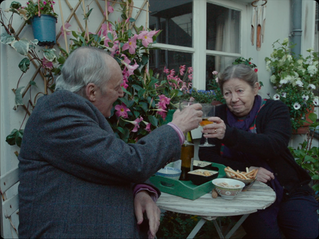Women on the Verge of a Nervous Breakdown
- Isobel Wise
- Jan 1, 2021
- 2 min read
Updated: Feb 2, 2021
Pedro Almodóvar, 1988

Pedro Almodóvar’s Women on the Verge of a Nervous Breakdown is a masterclass in riotous fun. Set predominantly within a cavernous penthouse in Madrid, an ensemble cast traverse their personal conflicts over the course of two days. Pepa (Carmen Maura), a voice-over actor whose breakup with colleague Iván (Fernando Guillén) leaves her tearful and irate, is sought solace in by friend Candela (María Barranco), who worries her affair with a Shiite terrorist will lead to trouble. Just as Candela begins to divulge her distress, they are greeted by Iván’s son Carlos (Antonio Banderas) and his fiancé Marisa (Rossy de Palma) who visit Pepa’s apartment on the grounds of renting it for themselves. What follows is a parade of broken windows, gazpacho laced with sleeping pills, and, arguably, the most camp car chase ever captured on film. Fusing melodrama and comedy with a uniquely Almodóvarian flamboyance, Women on the Verge explodes with madcap action and extravagance.
Despite being shot on a modest budget of just £700,000, the penthouse-cum-refuge bulges with kitsch trinkets, house plants, beach balls, and modernist furniture, boasting the tenets of Roy Lichtenstein and Andy Warhol in its brazen use of primary colours. This pageantry is rendered in polyester and bold patterning for the wardrobes of the characters who inhabit it. Pepa, struggling to overcome her heartbreak, exchanges her pink satin pyjamas for brightly coloured powersuits and shoulder pads. A tracking shot details her pacing the room in stilettos as she decides her plan of action. Candela, entirely distraught by her ordeal, attempts to jump from the terrace and loses one of her cornflower blue brothel creepers in the process. What remains of her ensemble, rather wonderfully, is a denim jacket trimmed with pompoms and a pair of coffee percolator earrings that dance feverishly as she speaks. A camp taxi driver sports bleached hair and a love of mambo, Rossy de Palma’s face exudes Cubist stylings, bejeweled brooches are paired with parrot-shaped earrings, and Pepa sets her bed aflame in an oversized Hawaiian shirt. Perhaps most exquisitely dressed of all is Lucía (Julieta Serrano), mother of Carlos and the resentful ex-wife of Iván. Clad exclusively in the fashion of the ‘60s, Lucía wrestles her insanity beneath heavy wigs and false eyelashes with cartoonish flair.


Stripping female hysteria from its historical misogyny, Women on the Verge reimagines the plight of its women as strength. Strength of resolve, conviction, self-preservation and friendship come out triumphant, the likes of Pepa, Candela and Lucía, alongside secondary characters, exhibiting this triumph with great gusto. Whilst being a swirling explosion of energy and colour, there is an earnestness within the melodrama, a cognisance embedded beneath the spectacle. Almodóvar’s camera does not gaze with judgement but rather maintains a playful and flirtatious eye, capturing what is humorous, endearing, and above all, stylish.









Comments